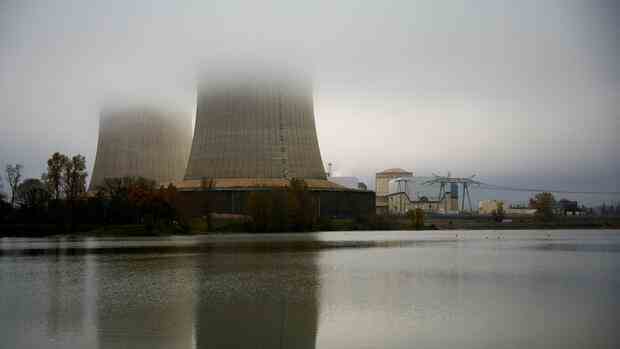For Paris, the agreement is a setback in the attempt to advance nuclear power as an alternative to renewable energies in Europe.
(Photo: Reuters)
Brussels The EU institutions have agreed on stricter requirements for renewable energies. By 2030, at least 42.5 percent of European energy consumption should come from these sources. Previously, 32 percent were planned.
The EU is putting pressure on to speed up the approval process. When building wind farms, an overriding public interest is generally assumed. This has already been decided in Germany. The procedures would be shortened from the previous five to seven to one to three years in the future, said Markus Pieper (CDU), who led the negotiations for the European Parliament.
The corresponding Renewable Energy Directive is a key piece of legislation in the EU’s “Fit for 55” climate protection package. As a result of Russia’s attack on Ukraine and the halt to Russian gas exports, the target was raised several times in the course of the negotiations.
The rate of 42.5 percent is broken down to the EU countries. Not every country has to achieve the same value.
Just small loophole for nuclear power
The agreement must now be formally approved by the EU Parliament and the Council of EU Member States. However, the law could still fail. France had tried until recently to strengthen the role of nuclear power, but had largely failed.
The aim was for hydrogen produced from nuclear energy to be treated in a similar way to hydrogen produced from renewable energy. This is now only possible to a very limited extent and only in countries that already have a very high share of renewable energies.
“The European Parliament has fended off the advance,” said Pieper. Now only Sweden would probably benefit from the regulation. This is piquant, since Sweden currently holds the EU Council Presidency and therefore conducted the negotiations on behalf of all EU states.
France has too few renewable energies to benefit from the scheme. For Paris, the agreement is accordingly a setback in the attempt to promote nuclear power as an alternative to renewable energies in Europe. If the decision is confirmed, France might even have to reconsider its strategy of relying predominantly on nuclear power.
>> Read here: Surrounded by nuclear friends? This is what the nuclear plans of Germany’s neighbors look like
A quota for e-fuels
A new quota for fuels for transport will be introduced. By 2030, 5.5 percent of fuels should be climate-neutral. Most of this is said to come from modern biofuels derived from plant residues.
However, at least one percent of the fuels should be provided as e-fuels, which are produced from green hydrogen and CO2. Companies that want to start producing e-fuels thus have investment security for their first projects.
The EU is steadily increasing the targets for renewable energies.
(Photo: mauritius images / Daniel Reiter)
The use of synthetic fuels in vehicles is controversial, since more energy is lost than when driving with electricity from batteries or fuel cells. The use of larger amounts of e-fuels in road traffic can drive up prices, making flights and sea transport more expensive, where there are hardly any climate-neutral alternatives to these fuels.
The rate of 5.5 percent refers to all of these means of transport in total. It could be achieved through admixtures or by offering pure e-fuels. That is left to the Member States. As a result, there is now a technology-neutral basic structure for the use of synthetic fuels, said Pieper.
Burning wood is still permitted
It was controversial whether wood and other biomass should continue to be regarded as renewable energy. The increased quota is a “milestone,” said Green MEP Anna Deparnay-Grunenberg, “but I see a serious risk that it will come at the expense of forests.” Even clear cuts that destroy entire ecosystems could still be considered sustainable.
The law will contain provisions intended to prevent such clear cuts. However, it is up to the Member States to determine what a forest is worth protecting. Burning high-quality wood also contributes to meeting the quota. She should no longer be supported financially.
With the law, the EU is undermining its own climate strategy and its biodiversity strategy, said Deparnay-Grunenberg. Protecting forests plays an important role in both strategies.
More: New EnBW boss announces: “We are planning to phase out coal by 2028”
